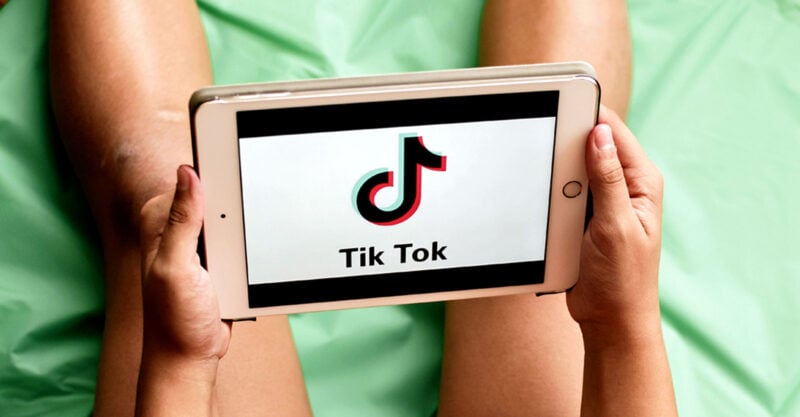
Indiana Attorney General Todd Rokita on Wednesday filed two lawsuits against TikTok accusing the company of exposing minors to inappropriate adult content and deceiving users about China’s ability to access their data.
Indiana’s attorney general on Wednesday filed two lawsuits against TikTok accusing the company of exposing minors to inappropriate adult content and deceiving users about China’s ability to access their data.
“The TikTok app is a malicious and menacing threat unleashed on unsuspecting Indiana consumers by a Chinese company that knows full well the harms it inflicts on users,” Attorney General Todd Rokita said. “With this pair of lawsuits, we hope to force TikTok to stop its false, deceptive and misleading practices, which violate Indiana law.”
The first lawsuit alleges that TIkTok is a “Chinese Trojan Horse” that lures young people onto its platform by making false claims about age-appropriate content, but then pushes “salacious and inappropriate content to all young U.S. users 13 and up for unlimited periods of time, day and night, in an effort to line TikTok’s pockets with billions of dollars from U.S. consumers.”
The second suit alleges that TikTok failed to disclose to consumers the Chinese government’s ability to access the sensitive and personal data collected on the app, which China can use to “spy on, blackmail, and coerce users” for its national security interests.
Indiana is seeking penalties of up to $5,000 per violation and a permanent injunction to force TikTok to stop marketing itself to young teenagers and to stop its deceptive and misleading claims about its handling of data.
“TikTok is a wolf in sheep’s clothing,” the attorney general’s office said.
Indiana’s lawsuits come amid growing concern about TikTok from state and federal officials. On Tuesday, Texas Gov. Greg Abbott ordered state agencies to ban the use of TikTok on government-issued devices, citing concerns that the platform could assist China in “gaining access to critical U.S. information and infrastructure.”
His announcement follows the lead of several other states, including South Dakota, Maryland, North Dakota and South Carolina, where governors issued similar orders in the last two weeks.
TikTok declined to comment on the lawsuits, but spokesperson Brooke Oberwetter said in a statement that “the safety, privacy and security of our community is our top priority.”
“We build youth well-being into our policies, limit features by age, empower parents with tools and resources, and continue to invest in new ways to enjoy content based on age-appropriateness or family comfort,” Oberwetter added.
“We are also confident that we’re on a path in our negotiations with the U.S. government to fully satisfy all reasonable U.S. national security concerns, and we have already made significant strides toward implementing those solutions,” she said.
Regarding the state bans, the company said, “We believe the concerns driving these decisions are largely fueled by misinformation about our company.”
Long-term bipartisan concerns over children and China
The attorney general’s office said the lawsuits are the first of their kind against TikTok and its parent company ByteDance.
Both lawsuits allege that TikTok is violating the state’s consumer-protection laws by deceiving the public about its operations.
In the first complaint about impacts on children, the state alleged that TikTok misrepresents its platform as safe for users age 12 and older. To have a 12+ or T (Teen) rating in app stores, the app represents references to mature themes as “infrequent/mild.”
The lawsuit alleges that the app instead allows, recommends and makes abundantly available content with alcohol, drugs, sexual content and intense profanity.
According to the lawsuit, TikTok is the most used app among American teens, who use it for an average of 99 minutes per day. The app has more than 100 million users in the U.S. and more than 1 billion users worldwide, The New York Times reported.
TikTok made some effort to limit harm to children by increasing parental control options, after agreeing to a $5.7 million settlement with the U.S. Federal Trade Commission in 2019 for illegally collecting personal data from children.
Despite these changes, the public and officials remain concerned.
Four Congress members on Wednesday wrote to TikTok CEO Shou Zi Chew requesting a meeting before the end of the year. The letter stated:
“Considering that about half of all U.S. children use TikTok every day, our concerns enumerated above are paramount. … Therefore, we ask you [to] provide the Committee with a briefing as soon as possible, but no later than December 21.”
In March, a bipartisan group of state attorneys general opened an investigation into TikTok’s impact on youth mental health, also seeking to determine whether any of the apps’ practices violate state consumer protection laws.
This investigation followed a similar multi-state probe into Meta, parent company of Facebook and Instagram, announced in November 2021.
For years, TikTok has faced bipartisan concerns about the potential for the Chinese government to access TikTok to collect Americans’ user data and use it to undermine U.S. interests.
Two years ago, the U.S. Armed Forces prohibited use of the app on its devices.
Concerns heightened in June when Buzzfeed reported that TikTok user data had been repeatedly accessed from China, despite the fact that TikTok had repeatedly reported that its user data was stored in the U.S. rather than in China.
A TikTok executive testified before a Senate panel this year that it doesn’t share information with the Chinese government and that a U.S.-based security team determines who can access U.S. user data from China, but would not commit to ending flows of U.S. user data to China, CNN reported.
The Trump and Biden administrations sought to regulate TikTok over concerns about its data security and its ties to China. Former President Trump threatened to ban TikTok if it wasn’t brought under U.S. ownership. The Biden administration has been negotiating with TikTok to address national security concerns.
